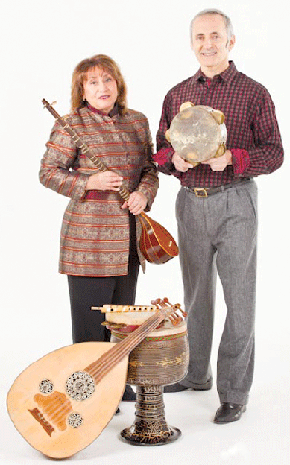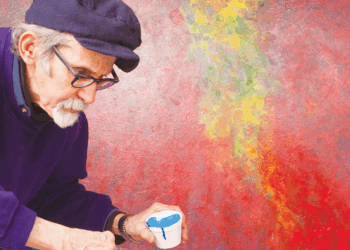Voices of Sepharad will present ‘A Night in Persia’ on March 20 and 21 to celebrate Purim and the Persian New Year
By ERIN ELLIOTT BRYAN / Community News Editor
Mark your calendars for March 20. Not only is it the first day of the much-awaited spring season, but it’s also the date of Purim, the Jewish festive holiday, and Nowruz, the Persian New Year that predates Islam.
In celebration of these occasions, performance ensemble Voices of Sepharad will present “A Night in Persia” on March 20 and 21 at Illusion Theater in Minneapolis. According to a press release, the event will evoke “a cultural crossroads in which Jewish music of the Middle East shares the stage with the rich music of traditional Persian culture.”
Queen Esther, the heroine of the Purim story, was a Jewish queen of the Persian king Ahasuerus. And the events that take place in the Book of Esther — the megilla, which is read each year — took place in ancient Persia.
“How interesting to actually return Purim to the Middle East, so to speak,” musician and writer David Jordan Harris told the AJW.
 Maryam Yusefzadeh and David Jordan Harris will present “A Night in Persia” at Illusion Theater in downtown Minneapolis. (Photo: Ran Shapira)
Maryam Yusefzadeh and David Jordan Harris will present “A Night in Persia” at Illusion Theater in downtown Minneapolis. (Photo: Ran Shapira)
According to Harris, who founded Voices of Sepharad in 1986 with dancer Judith Brin Ingber, a similar program was staged two years ago as part of the interfaith arts festival Spirit in the House, which attracted Iranians, Jews and the general public.
“Everyone stared at one another in amazement: why hadn’t they been in this room together before? This is one of the functions of art: it brings us together as a community in ways that we are not normally inclined,” Harris said. “I was so inspired by that. Then when this year rolled around and Nowruz, the Persian New Year, and Purim actually fell on exactly the same date, which is very unusual, I thought, I must do this show again.”
In this version, Harris has partnered with Iranian native Maryam Yusefzadeh, who formed the Persian music ensemble Robayat in 1989. The concert will also feature several local accomplished performers of Middle Eastern music: hand percussionist Mick LaBriola; violinist David Stenshoel; oud player and guitarist David Burk; and Dawn Doering on ney, the Persian and Arabic end-blown flute.
For his part, Harris will sing Purim-related music from the Mediterranean and Middle Eastern Jewish cultures — those of the Sephardic communities of Turkey, Greece and Jerusalem. He will sing the songs in their original languages as well as in translation.
Harris said that most Western Jews are familiar with the Ashkenazic Purim songs and customs, which are often associated with children. But Sephardic Purim music is “fun and sophisticated and highly entertaining.”
“One of the main reasons I’m doing this is that it’s an opportunity to lift up the historic Jewish community that was based in Persia. At the moment, it’s still the second-largest Jewish community in the Middle East, second only after Israel,” Harris said. “We want to make sure that there’s a context for the music that everyone’s hearing. We’re not assuming that people know this cultural variety that exists around Purim. It’s like any other Jewish holiday — every Jewish community, depending on where it was located around the world, celebrated it in a very specific way.”
Harris said the Jewish community never existed in isolation and had a tremendous impact on Persian music and culture, and vice versa. Purim, he said, was a “hybrid holiday” and an “amalgamation of non-Jewish elements” — even the names of Esther and her uncle Mordechai derive from the Babylonian gods Marduk and Ishtar.
Yusefzadeh referred to Purim as a “Persian-Jewish celebration because of Queen Esther.” She said this performance is an opportunity to showcase that connection.
“It was more meaningful for me to bring that aspect of the Persian culture out into the open, knowing that most media do not speak of the influence of Judaism and Jewish culture in Persian art, Persian music and Persian history,” she told the AJW.
The Persian New Year, Nowruz, is a Zoroastrian holiday that predates Islam by thousands of years. According to Yusefzadeh, it marks the spring equinox and is a “celebration of life,” which includes a variety of traditions that represent good fortune for the coming year.
“It’s an opportunity for the family… to explain different things to each other, and have different experiences with the grandparents and the great-grandparents, and what it has meant to them throughout the years,” Yusefzadeh said. “Even though Zoroastrianism has been basically depleted… it’s still being practiced as a very critical part of the Persian New Year process, no matter what religion the Persians are.”
During the show, Yusefzadeh will perform a sampler of classical and contemporary Persian music. Jewish musicians, she said, preserved much of the ancient music when the Persians lost the war to the Arabs.
With “A Night in Persia,” Yusefzadeh said she wants to accomplish “a better understanding of humanity.”
“Only through compassion can we reach peace and understanding with each other,” she said. “Through music, we can find the beauty in each of our spirits, in our cultures and in who we are as people, particularly in the Middle East region.”
***
“A Night in Persia” will take place 2 p.m. Sunday, March 20; and 7 p.m. Monday, March 21 at Illusion Theater, located on the eighth floor of the Hennepin Center for the Arts, 528 Hennepin Ave., Minneapolis. Tickets are $20 for general admission; $15 for students, seniors and groups of 10 or more; and $10 for children younger than 12.
For tickets and information, call 612-339-4944 or visit: www.illusiontheater.org. For information on Voices of Sepharad, visit: www.voicesofsepharad.com.
The performance is supported, in part, by funds provided by the Metropolitan Regional Arts Council from an appropriation by the Minnesota Legislature. It is co-sponsored by the Jay Phillips Center for Interfaith Learning at the University of St. Thomas and by Interfaith art pARTners: a Twin Cities Festival.
(American Jewish World, 3.4.11)








 Maryam Yusefzadeh and David Jordan Harris will present “A Night in Persia” at Illusion Theater in downtown Minneapolis. (Photo: Ran Shapira)
Maryam Yusefzadeh and David Jordan Harris will present “A Night in Persia” at Illusion Theater in downtown Minneapolis. (Photo: Ran Shapira)









